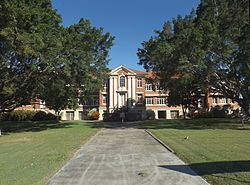Stafford State School
| Stafford State School | |
|---|---|

Stafford Road entrance, 2015
|
|
| Location | 314 Stafford Road, Stafford, City of Brisbane, Queensland, Australia |
| Coordinates | 27°24′43″S 153°01′04″E / 27.4119°S 153.0178°ECoordinates: 27°24′43″S 153°01′04″E / 27.4119°S 153.0178°E |
| Design period | 1940s - 1960s (post-World War II) |
| Built | 1948–1955 |
| Architect | Queensland Department of Public Works |
| Architectural style(s) | Classicism |
| Official name: Stafford State School | |
| Type | state heritage (built) |
| Designated | 26 February 1999 |
| Reference no. | 601667 |
| Significant period | 1940s (historical) 1940s-1950s (fabric) 1948 ongoing (social) |
| Significant components | school/school room |
Stafford State School is a heritage-listed state school at 314 Stafford Road, Stafford, City of Brisbane, Queensland, Australia. It was designed by the Queensland Department of Public Works and built from 1948 to 1955. It was added to the Queensland Heritage Register on 26 February 1999.
Stafford State School is a substantial three storey brick building located on a 5.138 hectare site on the corner of Stafford and Webster Roads, facing Stafford Road. It was constructed in 1948-49 as the principal building of Stafford State School, providing primary education to children of the Stafford district. Stafford State School also incorporates formal gardens in the foreground of the school and large open playing fields to the rear of the building, established at the same time as the principal school building.
Stafford's original name was Happy Valley until 1886, when a government administrator questioned whether such a name was dignified enough to grace a new school. It is one of the few places in Queensland which takes its suburban name from the school. Happy Valley incorporated the suburbs now known as Everton Park and Stafford, and remained a semi-rural area well into the twentieth century. Local industry included tanneries, fellmongers and dairy farms. In 1886, simple timber school building and teachers residence were constructed on the original Collier Street site, where the Stafford State Pre-school is now located.
In 1940 the tramline from Red Hill was extended to Stafford Road. Closer settlement was encouraged with the establishment of a housing commission estate during World War Two on the eastern side of Webster Road and the Somerset Hill subdivision was established after the war. The general changes in post war Australian society felt through the return of service personal, a baby boom and an influx of immigrants from Europe coincides with these infrastructural planning changes for the area.
In 1947, a 12-acre site was purchased for the new school from John Smith. During the second world war, substantial changes were made to the incorporation of physical education into the primary curriculum. Specialised physical education teacher training had commenced in Queensland in 1941 with the first batch of graduates employed under the Organiser of Physical Education in 1944. In 1944, the Director General of Education called for the "enlarging of existing school grounds or acquisition of new sites" to accommodate facilities for field games. At this time organised games revolving around fair play and emphasising teamwork were included as part of the broader themes of educational philosophy. In order to accommodate such changes, the Department of Public Instruction began to purchase sites which allowed adequate space to be dedicated to physical education. Stafford State School had two full playing ovals accommodating, football, cricket, basketball, vigaro, hockey, and athletics with a swimming pool and grandstand complex added later.
...
Wikipedia


